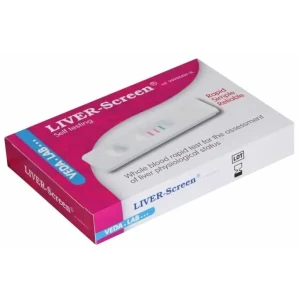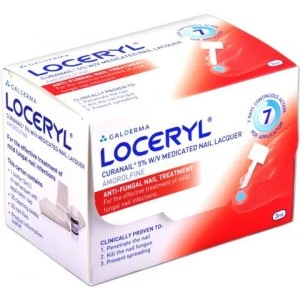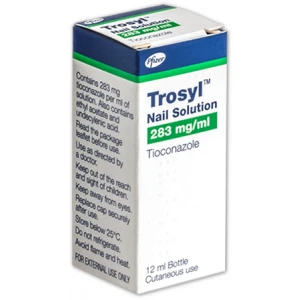Fungal nail infections
Fungal nail infections can cause nails to become discoloured and brittle. This contagious condition can cause pain if left untreated, impacting daily activities. Read on to find out more about this condition, its symptoms, treatments and preventive measures you can take.
Liver Function Test Kit
- At Home finger-prick
- Simple finger prick test
- Instant Results
Loceryl Curanail
- Treats fungal nail infections
- Applied twice weekly
- Dispensed from UK UK-registered pharmacy
Terbinafine
- Directly kills fungus
- Available as cream or tablets
- Short course of treatment
Terbinafine Cream
- Directly kills fungus
- Available as cream
- A Short course of treatment
Trosyl Nail Solution
- Kills infection from the source
- Simple to apply nail solution
- Eligible for next-day delivery
What is a fungal nail infection?
Also known as onychomycosis, fungal nail infections are more common in toenails than in fingernails. The fungal infection develops gradually and can be challenging to treat.
In many cases, a fungal nail infection is caused by the same fungi responsible for athlete's foot. Because the condition is contagious, you should take precautions to minimise the risk of exposing others to the infection.
An infection in the nail can significantly impact daily activities. A fingernail infection can affect dexterity, while a toenail infection can interfere with walking and exercise.
Diagnosis of the condition can usually be made based on the physical and visible characteristics of the infection, also known as the clinical picture. Otherwise, a sample of the infected nail(s) can be taken and tested to determine a diagnosis.
If left untreated, a fungal nail infection can cause pain and permanent damage to your nails. The infection can also spread to other parts of the body in individuals with a suppressed immune system.
Moreover, fungal nail infections, such as athlete's foot, are contagious and can be transmitted to others. Shared nail beauty apparatus, such as files, clippers, and towels, can spread the infection to others. Warm, moist environments, such as communal showers, changing rooms, and swimming pools, where people are barefoot, provide an ideal environment for the fungus.
It is important to treat your fungal nail infection to prevent further damage to the nail.
What are the symptoms of a fungal nail infection?
The following symptoms characterise fungal nail infections:
- Brittle nail
- Cracked skin surrounds the nail
- Discolouration of the nail
- Distortion of the nail
- Itchy, red or swollen skin around the nail
- Pain when applying pressure to the affected nail
- Whitish thickening of the nail
As the infection spreads, it can cause the infected nail to lift from the nail bed. In severe cases, the affected nail may need to be partially or permanently removed.
How can you prevent a fungal nail infection?
Fungal nail infections can be prevented by practising good hygiene.
Washing your feet daily and drying them thoroughly before putting on socks and shoes can prevent fungal infections.
Wearing clean cotton socks and shoes that fit well can make your feet less hospitable to fungi.
Avoid traversing barefoot in areas that allow fungi to spread easily, such as communal showers, locker rooms and gyms.
If you experience an athlete's foot infection, there is a risk that it can spread and cause a fungal nail infection. You may need to replace socks and shoes that you wore while you had athlete's foot.
Treating a fungal nail infection
Fungal nail infections do not clear up on their own, and leaving them untreated can cause the infection to spread. You can buy terbinafine tablets to treat fungal nail infections.
Your doctor may suggest a topical treatment, such as Loceryl nail lacquer, to treat the infection. Topical treatments are applied directly to the site of infection, killing the fungi over time. The lacquer must be applied daily to the infected nail(s) semi-weekly.
When treating a fungal nail infection, it is essential to continue the treatment until the infection is completely cleared; otherwise, there is a risk that the infection will recur. You may need further appointments with your doctor to determine that the treatment is still effective.
Treating a fungal nail infection does not make you immune to future infections. To reduce the chances of contracting a fungal nail infection, it's essential to practise good foot hygiene by keeping your feet clean and dry.
References
https://www.nhs.uk/conditions/fungal-nail-infection/
https://www.bmj.com/content/348/bmj.g1800
© 2013 - 2026 Al Muhsineen Limited. All Rights Reserved. Registered Pharmacy: 34 Halliwell Road, Bolton BL1 8RL. Registered Office: 254 First Floor, Shearbrow, Blackburn, England, BB1 8DS











